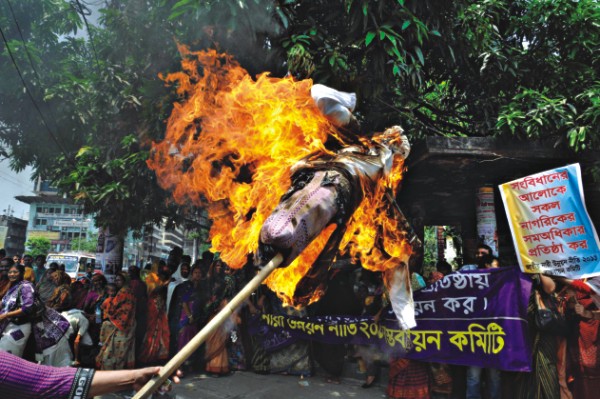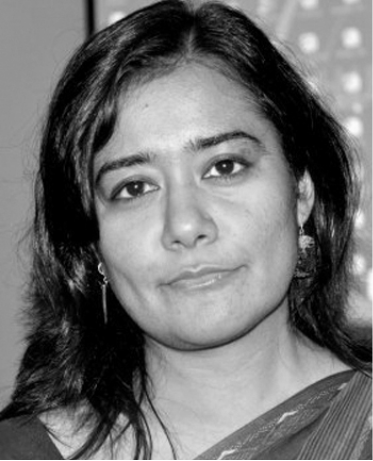
10 mins read
‘Equal Property Right’: Much Ado about Nothing
T
The reaction to this threatening activity was neither positive for women activists who have forever demanded equal property rights, nor for the women of this country in general. The government was unsteady about its decision from the first hour. Right after the declaration of the women’s policy, Mahbub Alam Hanif, the Joint Secretary of Awami League, said in an interview, “The government has not brought any change to the Muslim property distribution law. The Government has simply stated women’s right to property through inheritance that Islam has given to both men and women.” Afterwards, Dr Shirin Sharmin Chowdhury, the honourable state minister to the Ministry of Women and Children Affairs, and the honourable Prime Minister Sheikh Hasina herself, assured that no law going against the Quran would be enacted. The latest update is that while addressing about 150 leaders of the Bangladesh Jamiatul Modarasin, a pro-Awami League platform of Madrasa teachers, on April 20, the Prime Minister re-assured that her government has already removed all contradictions regarding religion from the National Women Development Policy to make it confusion free. In her own words, “After examining the Quran, especially Surah An-Nisa, we have removed existing contradictions from the policy” (The Daily Star, April 21, 2011). However, despite reiterated assurances from the Prime Minister that nothing would be done against the scriptures, Amini’s party, under the banner of Islamic Law Implementation Committee, has announced country-wide protests on May 6, 7, 11, 12, 16 and 22 at divisional headquarters and in the capital on May 27, against the implementation of the Women and Education Policy. Jamaat-e-Islami will also hold a country-wide demonstration on May 7 demanding scrapping of certain provisions of the policy.
The clause in dispute
On March 9, the day after the declaration, a very misleading headline was published in many of the national dailies, that the National Women Policy 2011 has been declared with the provision of equal property inheritance rights for men and women. The headlines were so convincing that many, even conscious citizens and women activists of the country, thought these headlines were genuine. It took a while to understand that the policy did not provide equal property rights, at least till the policy reached our hands. So which is the clause that has been questioned?
In clause 25(2), the section that deals with the economic development aspect of the 2011 policy, it is stated that women would be given full control over the wealth that they have obtained so far through earnings, inheritance, loan, land and market management. Awami League, the main party of the present Grand Alliance Government (Mohajote Sarkar), made the commitment in their election manifesto of 2008 to fully implement the Women Development Policy 1997. In section 7.2 of the 1997 policy, it was stated that “Women would be given full and equal rights, and control over earnings, inheritance, wealth, loan, land and wealth earned through technology and market management, and new laws would be enacted to achieve this goal.” Thus the Women Development Policy 2011 is clearly a step backwards from the Women Development Policy of 1997, at least in terms of the right to inherited property. According to the newly proposed policy, if enacted and implemented properly, women would get the control over their property, only if it is already allowed by religious laws. This is far from the equal property right of 1997.
Awami League thus did not keep its promise from the election manifesto for women of this country. The question that arises then is why there is so much frenzy around the issue?
We get three different views about the policy. The Government says that the policy is a progressive move to ensure women’s rights but not conflicting with the Quran; the religious groups and parties which claim that it is anti-Islamic and should be scrapped; and there exists a third force compiled of women activists and the female wings of some leftist parties who refuse this policy on the grounds that it has not given equal property rights to women, which in turn betrays the commitment that Awami League made in its election manifesto. The third force even thinks that with the amendments to the 1997 policy in relation to the inheritance law and the comments repeatedly made by the Prime Minister, there is very little difference, if any, between the position of the government and that of Amini’s.
It’s all about the property rights
Apparently it seems that the only opposition force to the equal rights to property for women are religious groups. However, if we look carefully, we will see that our patriarchal politics vehemently oppose this demand. We saw just the religious groups on the streets. Sometimes I wonder what difference it would have made if these religious groups had not come to the streets. Clause 7.2 that included equal property inheritance rights for women in the 1997 policy was an outcome of the long-lived demands of Bangladeshi women. Although the then Awami League government had enough time (1997-2001) to implement the policy and there was no manifested agitation by any religious groups, they did not take any measure to pass a law nor implement a policy. Then out came the second draft Women Development Policy in 2004. The BNP-Jamaat alliance government had only dropped the section on equal property inheritance rights and the right to land. We got the third draft Women Development Policy in 2008. In the 9.13 clause of this draft policy, right to equal property through inheritance and the right to land were dropped and a new phrase was adopted that would give women equal opportunity and control over wealth earned through the ‘management of market’. What was interesting was that the religious groups came out on the streets and the then caretaker government appointed a committee comprised of Alems (Islamic scholars) to scrutinise the policy. They gave their verdict on pen-and-paper and had a showdown on the streets; the policy eventually went up in smoke. This is the fourth time we are getting a draft policy and this too has dropped the provision of equal property rights, with the Prime Minister repeatedly announcing that her party will never enact any law or adopt a policy which conflicts with the Quran and Sunnah. BNP has not yet expressed its position on the policy, nor has any other party, officially. It is interesting that we never learned about the position of any political parties on the consecutive four draft women policies. When the BNP-Jamaat alliance government dropped the whole thing about the inheritance of property act, Awami League was not on the streets, neither was the Jatiya Party. At the time of the caretaker government, no party expressed their official position about the policy. So, what we find is a spiral of silence from all the political parties regarding women’s equal right to property. According to the theory of representation by Stuart Hall, absence tells a lot, sometimes it may even tell a lot more than what is seen through bare eyes. Should we read this silence as not a single party wanting to resolve this fiasco of equal property rights? Throughout the policy there are lots of clauses which are clearly conflicting to religious doctrine, but all the time we see the agitated religious mob on the streets demanding the ban of only one clause, the one dealing with equal property rights. Thus the declarers of women’s policies, the oh so silent political groups and the ones making a frenzy out of it all are simply strengthening the tide of no women’s right to equal property. In fact, why should patriarchy bother at all for equal property rights for women if they can enjoy the benefit of the discriminatory law in the name of religion or anything else?
Amended religious laws and the discourse of ‘no’ to equal property rights
Those of the opinion that this policy is anti-religious or those who are assuring that there is nothing anti-religious in the policy will not endorse any law against religion; it is necessary for both parties to realise that many religious doctrines have changed over the course of time. Although the provision of a woman state-head is not allowed in religion, we are proud to have had female prime ministers. The religion-based parties are also making alliances with women-led political parties. Even the leaders from the biggest Islamic party of Bangladesh had taken their oaths in the cabinet led by a woman. According to the 1937 Muslim Personal Law (Shariah Law), acted out in British-India, no minor would get the property of their maternal or paternal grandfathers if their parents died before the grandparents. But according to the clause number 4 of the Islamic Family Law of 1961, the children get the property from their grandparents even if their parents are alive. According to the religious law, any Muslim male can have four wives at a time, but according to clause 6 of the Muslim Family Law 1961, if anybody marries for the second time without the permission of the Salish Parishad, they may be imprisoned or fined or both. Hilla marriage has not been banned but it has been made difficult in clause number 7(6) of the 1961 law. According to the ‘Muslim Divorce Law 1939’, women are now allowed to divorce their husband if they are absent for more than four years, which was not the provision in the religious law. The Shufa Law of the Islamic provision has been replaced by the State Acquisition Law 1950. Besides, we are obeying many civil laws in our everyday personal and state matters, which do not have even a distant relationship with the religious laws. There is no law upholding the action of cutting one’s hand if she/he steals; neither is there any provision of taking two women’s evidence for one man’s evidence in our civil court. Thus it is possible to present numerous examples of existing laws that are not only incompatible but also conflicting with religious laws. Many Olama-Mashayekhs (religious leaders) give the fatwa that taking photos is haram and kufri, but they themselves have to be photographed obeying the passport laws when they wish to go on Hajj (Islamic pilgrimage). A slogan has been popularised for the last two decades, “Two children are enough, either boys or girls”. Attempts are even being made to persuade parents to be happy with one child. In this context, what might be the cause of not abolishing discrepancy in the distribution of property through inheritance? It is unfortunate that we see frenzies amongst religious zealots when the matter of a positive move for the betterment of women’s lives is brought up, which reaches the climax if there is a matter of property involved.
The Hindu community is also quite silent about this policy. Though Christian women get equal property rights, Hindu women do not get any access to inheritance in Bangladesh. Thus Hindu women of this country really do not gain anything with the proposed policy. If they do not have any access to inherited property, what is the benefit of having the full control on that property? But the equal property right has been established for Hindu women in India and the Hindu state of Nepal after amending the religious laws. Equal property right has been adopted even in Muslim countries like Egypt, Tunisia and Senegal.

Bangladesh is still the People’s Republic of Bangladesh
Bangladesh is not a country based on religious premises only. Rather, as the People’s Republic of Bangladesh, most of the laws are laid on democratic, secular principles. More than 90% of laws that we deal with in our everyday life, are secular and uniform. Equal rights for all men and women in every sphere of life has been guaranteed in clauses 10, 19 (1,2), 27, 28 (1,2,3,4), 29 (1, 2, 3-A) of our Constitution. There is no religious difference in the civil and criminal laws, and the same could also be done to the family laws. Family laws could be brought under the Uniform Civil Code to wipe out the differences.
If the government is really honest about women’s issues, it would revive the Women Development Policy of 1997, particularly clause 7.2. And, we, the people, who claim to be women-friendly, need to be effectual in the field. Fourteen years have passed since the policy of 1997, but our politics has been unable to prepare the people to accept this change. So, we had to retreat repeatedly from the position declared so long ago. It is the prime time for the government to rethink whether they should surrender to the demands of the religious fundamentalist forces or take initiatives to prepare people’s mentalities and join the people themselves in the fight for our rights as has been promised by the Constitution. Some of those initiatives may include communicating the message through mass media for awareness building and arranging for widespread rallies and meetings at divisional and district headquarters. These rallies and meetings should include the general public as well as members of political parties and civil societies to change the norms and establish new ones. Popular media personalities and celebrities may help spread this message through mass media. School teachers and opinion leaders, those at grass-root level, should be targeted to spread the message throughout the rural communities. Also popular folk media like jatra, putul naach (puppet show), kobi gaan may be utilised in villages.
It is a political struggle and it is not a choice anymore to create much ado about nothing.
Feature Image: The Daily Star




Your Opinion